目录
配置环境
环境:Windows10、Visual Studio 2019、Python3.x
打开VS,建立空项目。
第一步 导入Python3路径
1. 项目→属性→C/C++→常规→附加包含目录,添加Python3安装路径\include。
该文件夹下有Python.h,这就是C++调用Python的API前一定要include的库。
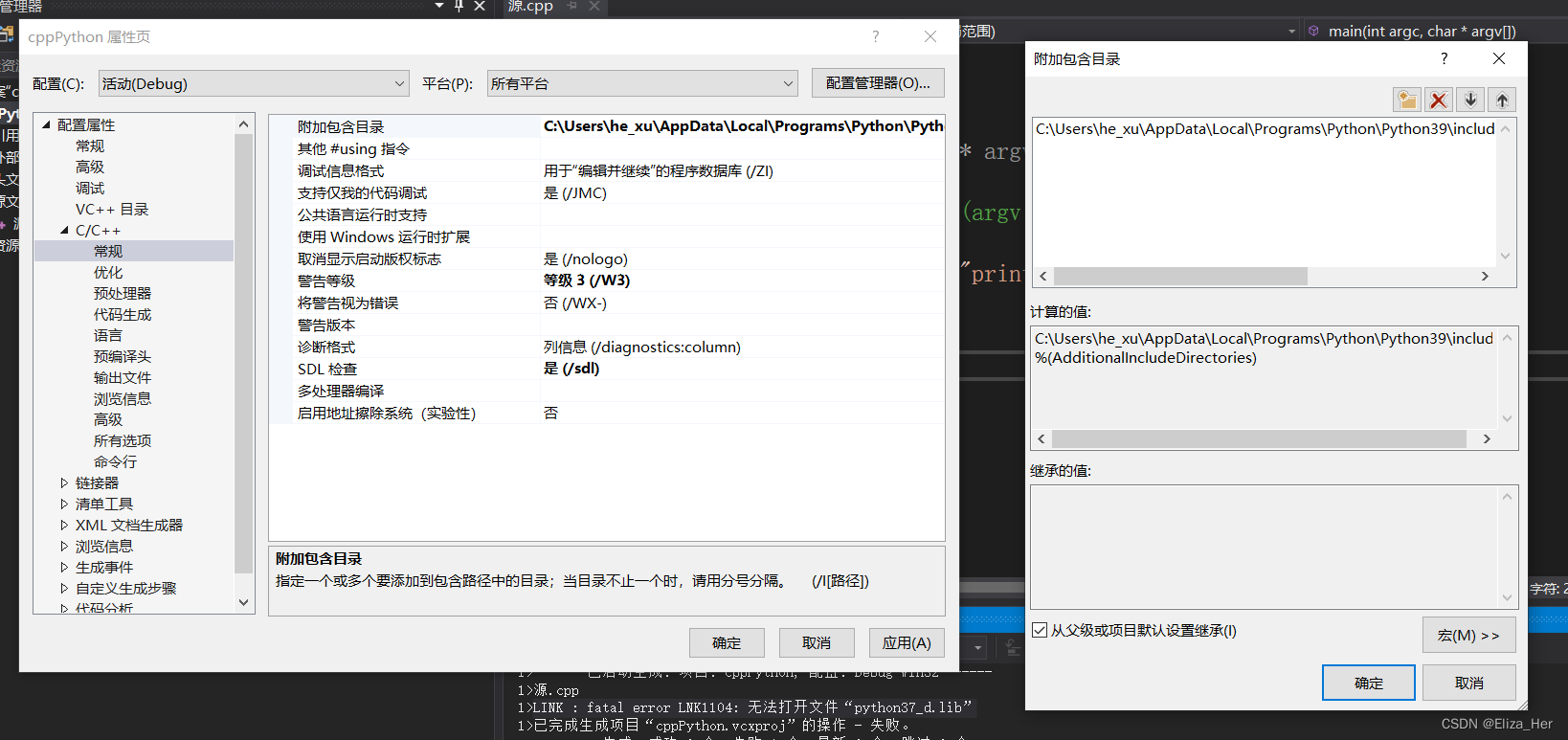
2. 项目→属性→VC++目录→库目录,添加Python3安装路径\libs。
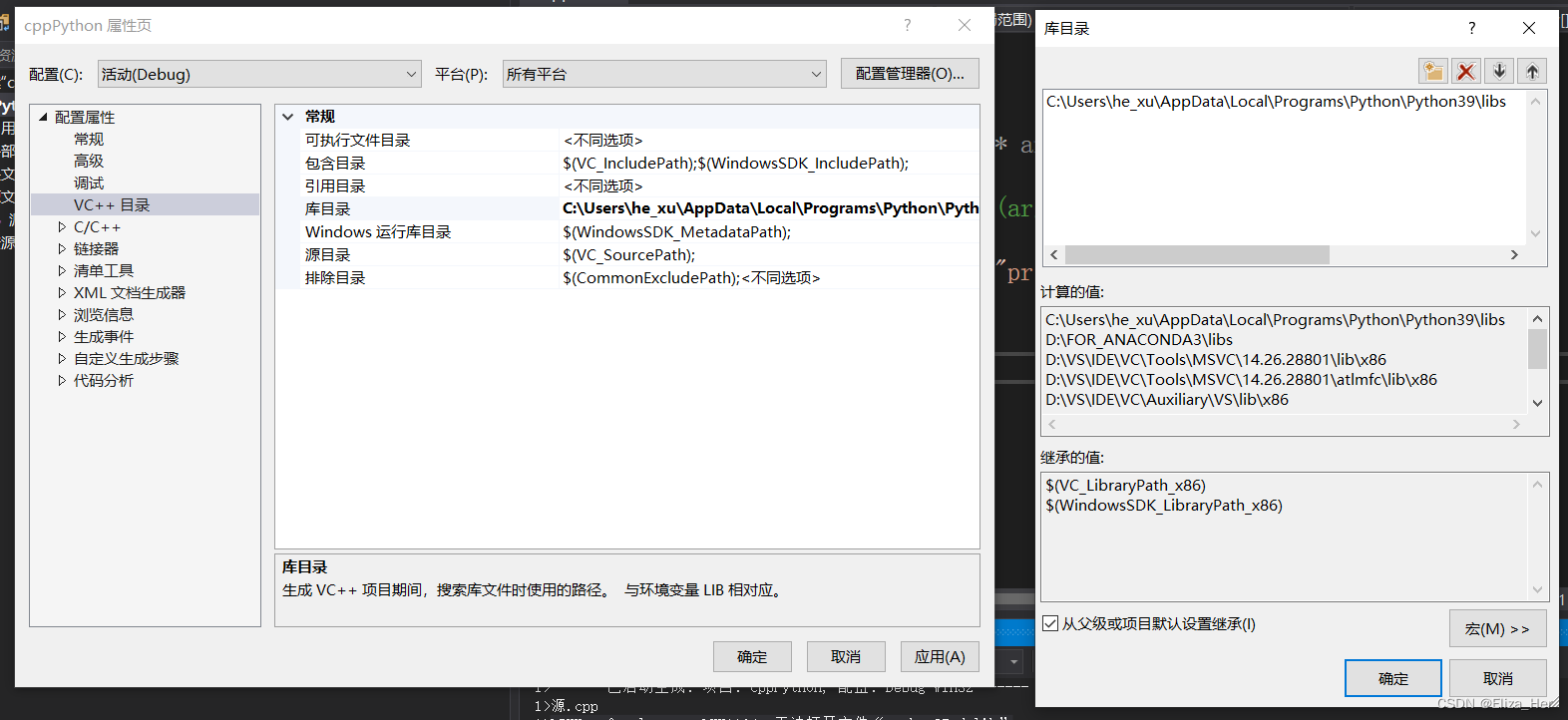
3. 项目→属性→链接器→输入→附加依赖项,添加Python3安装路径\libs\python39.lib。(如果Python版本是3.7则可以写python37.lib,以此类推)

4. 检查版本: 检查一下自己下载的Python是x86还是x64版本的,如果与VS版本不一致,可以在VS窗口上方调整项目版本。

第二步 测试环境
这是一个简单的helloworld程序。如果能够成功运行,则可以直接进入下一节。
#include <Python.h>
int main(int argc, char* argv[])
{
Py_Initialize();
PyRun_SimpleString("print('Hello, world!')");
Py_Finalize();
return 0;
}运行结果:

如果出现错误:LINK : fatal error LNK1104: 无法打开文件“python39_d.lib”,则说明没有安装Python的Debug功能,需要为Python增加Debug功能。增加方法如下图:
(注:针对该错误,除了本文中提到的方法,网上还有其它办法可供选择:扩展Python模块系列(一)----开发环境配置 - 建木 - 博客园 (cnblogs.com)。)
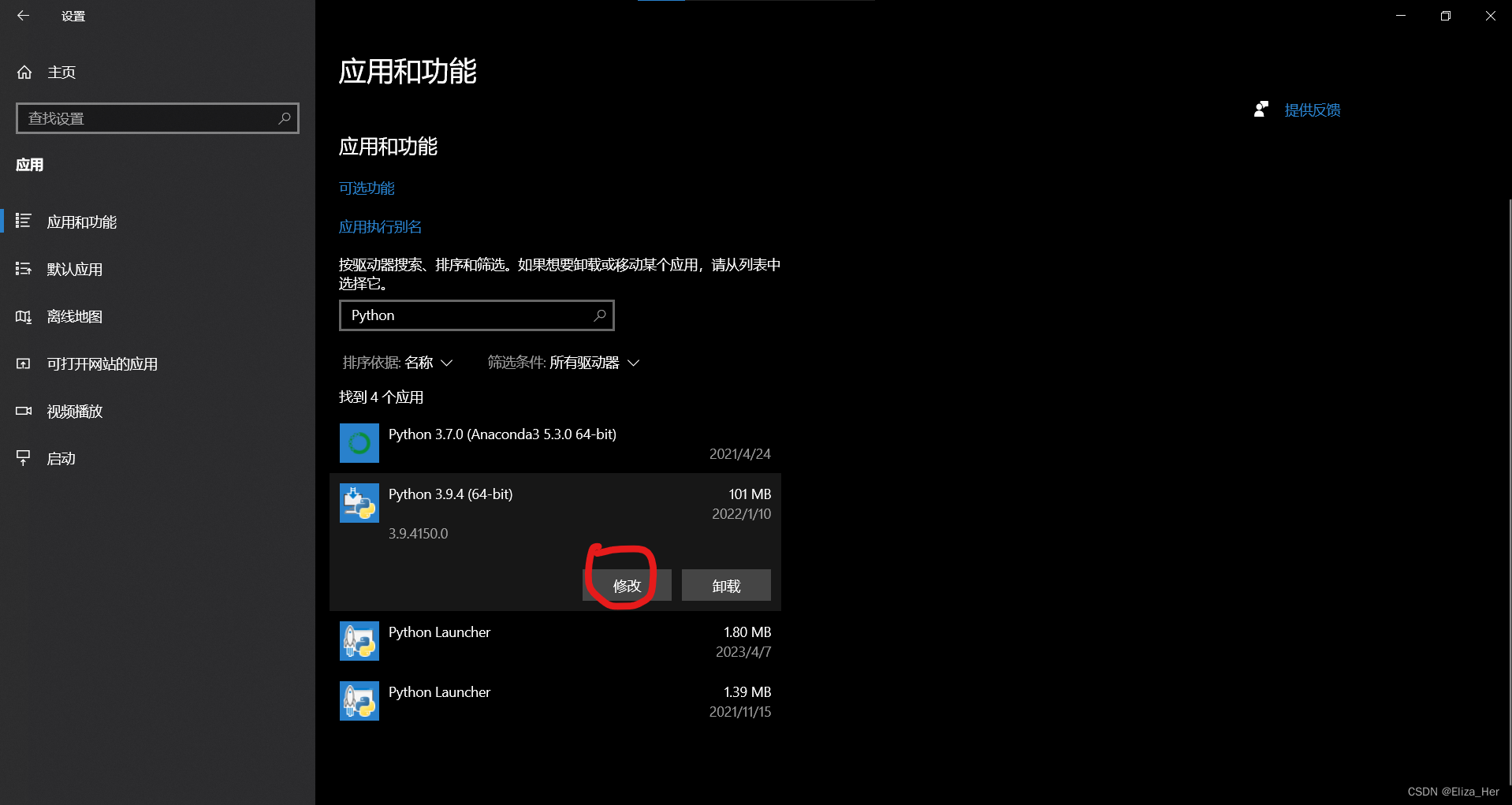


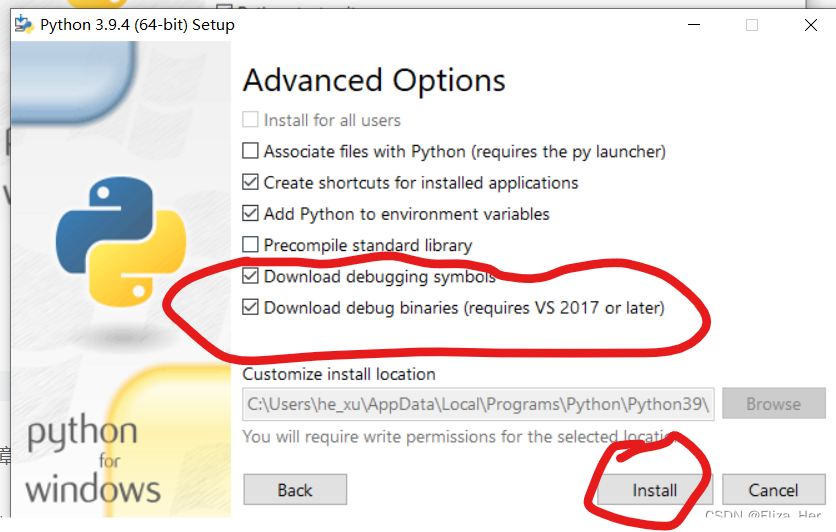
运行例程
C++调用Python的结构都如下:
#include <Python.h>
int main(int argc, char* argv[])
{
Py_Initialize(); //初始化
//... ...
Py_Finalize(); //结束,释放资源
return 0;
}注:下文仅包含C++运行或调用Python代码段、脚本、函数、类的基本方法,不包含进阶用法。
考虑到便利性,也由于其在 Python 解释器中被广泛使用, "Python.h" 还包含了一些标准头文件: <stdio.h> , <string.h> , <errno.h> 和 <stdlib.h> 。 如果后面的头文件在你的系统上不存在,它还会直接声明函数 malloc () , free () 和 realloc () 。
——Python官方文档
1. 直接运行Python代码段
#include <Python.h>
int main(int argc, char* argv[])
{
Py_Initialize();
PyRun_SimpleString("print('Hello from Python string')");
Py_Finalize();
return 0;
}2. 运行Python脚本
源目录下helloScript.py:
print("Hello from Python script")C++:
//my_python.c
#include <Python.h>
int main(int argc, char* argv[])
{
Py_Initialize();
PyObject* obj = Py_BuildValue("s", "helloScript.py");
FILE* file = _Py_fopen_obj(obj, "r+");
if (file != NULL)
{
PyRun_SimpleFile(file, "helloScript.py");
}
Py_Finalize();
return 0;
}3. 导入Python模块,调用Python函数
源目录下hello.py:
def Hello():
print("Hello from Python module")
def Add(a, b):
print ("Add function: ", end="")
print (str(a) + " + " + str(b) + " = " + str(a+b))
return a + bC++:
#include <Python.h>
int main(int argc, char* argv[])
{
Py_Initialize();
//必须修改Python路径,否则会找不到Python模块
PyRun_SimpleString("import sys");
PyRun_SimpleString("sys.path.append('./')");
PyObject* pModule = NULL;
PyObject* pFunc = NULL;
//import模块
pModule = PyImport_ImportModule("hello");//模块文件名
//找不到模块则报错
if (pModule == nullptr) {
PyErr_Print();
Py_Finalize();
return 0;
}
//1. 调用不带参数的函数 Hello()
pFunc = PyObject_GetAttrString(pModule, "Hello");//函数名
PyObject_CallFunction(pFunc, NULL);//调用函数
//2. 调用带参数的函数 Add(a, b)
PyObject* pAdd = NULL;
PyObject* args = NULL;
pAdd = PyObject_GetAttrString(pModule, "Add");
args = Py_BuildValue("(ii)", 123, 456); //设置传入Add的参数
PyObject* pRet = PyObject_CallObject(pAdd, args); //pRet = Add(123, 456)
//输出返回值
int ans = 0;
PyArg_Parse(pRet, "i", &ans);//返回类型转换
printf("Return C++: ans = %d\n", ans);
Py_Finalize();
return 0;
}4. 调用Python类
注:调用类中方法的API不止一套,建议去官网看看,并且建议使用Python3.9版本以上才支持的API,那些API对类的支持更好,不容易出现需要手动加入Python类的self参数的问题。
源目录下helloClass.py:
class myClass:
welcome = "Hello from Python class attribute"
def hello(self):
print("Hello from Python class method")
def minus(self, a, b):
print(str(a) + " - " + str(b) + " = " + str(a-b))
return a-bC++:
(1)Python3.9以下可用:
#include <Python.h>
int main(int argc, char* argv[])
{
Py_Initialize();
//必须修改Python路径,否则会找不到Python模块
PyRun_SimpleString("import sys");
PyRun_SimpleString("sys.path.append('./')");
PyObject* pModule2 = NULL;
PyObject* pFunc2 = NULL;
PyObject* pClass = NULL;
PyObject* pInstance = NULL;
PyObject* args2 = NULL;
pModule2 = PyImport_ImportModule("helloClass");//这里是要调用的文件名helloClass.py
if (pModule2 == NULL)
{
PyErr_Print();
Py_Finalize();
return 0;
}
// 模块的字典列表
PyObject* pDict = PyModule_GetDict(pModule2);
if (!pDict) {
PyErr_Print();
Py_Finalize();
return 0;
}
//从字典中获取myClass类
PyObject* pClassCalc = PyDict_GetItemString(pDict, "myClass");
if (!pClassCalc) {
PyErr_Print();
Py_Finalize();
return 0;
}
//构造实例
PyObject* pInstanceCalc = PyInstanceMethod_New(pClassCalc);
if (!pInstanceCalc) {
PyErr_Print();
Py_Finalize();
return 0;
}
//获取pInstanceCalc实例的属性,转换成字符串并输出
PyObject* obj2 = PyObject_GetAttrString(pInstanceCalc, "welcome");
PyObject* str = PyUnicode_AsEncodedString(obj2, "utf-8", "strict");
char* result = PyBytes_AsString(str);
printf("%s\n", result);
//如果属性是int型,可用下面这句转换属性:
//int qwq;
//PyArg_Parse(obj2, "i", &qwq);
//调用无参数Python方法,s和pInstanceCalc对应Python中的self
PyObject_CallMethod(pClassCalc, "hello", "s", pInstanceCalc);
//调用多参数Python方法,(s,i,i)和pInstanceCalc、12、22 分别对应Python方法中的 self、a、b
pRet = PyObject_CallMethod(pClassCalc, "minus","(s,i,i)",pInstanceCalc, 12, 22);
if (!pRet)
{
PyErr_Print();
Py_Finalize();
return 0;
}
int res = 0;
PyArg_Parse(pRet, "i", &res);//转换返回类型
printf("Return C++: ans = %d\n", res);
Py_Finalize();
return 0;
}(2)Python3.9以上可用:
PyObject* getClass(const char* fileName, const char* className) {
//必须修改Python路径,否则会找不到Python模块
PyRun_SimpleString("import sys");
PyRun_SimpleString("sys.path.append('./')");
PyObject* pModule = NULL;
PyObject* pClass = NULL;
PyObject* pInstance = NULL;
pModule = PyImport_ImportModule(fileName);
if (pModule == NULL)
{
PyErr_Print();
Py_Finalize();
return NULL;
//return 0;
}
// 模块的字典列表
PyObject* pDict = PyModule_GetDict(pModule);
if (!pDict) {
PyErr_Print();
Py_Finalize();
return NULL;
//return 0;
}
//从字典中获取myClass类
pClass = PyDict_GetItemString(pDict, className);
if (!pClass) {
PyErr_Print();
Py_Finalize();
return NULL;
//return 0;
}
//实例化
pInstance = PyObject_CallObject(pClass, NULL);
return pInstance;
}
int main(){
Py_Initialize();
PyObject* pInstance = getClass("sarsaScript", "RL");
//调用多参数Python类方法
//cjoose_action是方法名
PyObject* pAction = PyUnicode_FromString("choose_action");
std::string state = "state1";
PyObject* pState = PyUnicode_FromString(state.c_str());
//参数以NULL结尾
PyObject* pRet = PyObject_CallMethodObjArgs(pInstance, pAction, pState, NULL);
if (!pRet)
{
PyErr_Print();
Py_Finalize();
return -1;
}
int res = 0;
PyArg_Parse(pRet, "i", &res);//转换返回类型为int
//调用无参数Python类方法
//qwq是方法名
PyObject* pQWQ = PyUnicode_FromString("qwq");
PyObject_CallMethodNoArgs(pInstance, pQWQ);
Py_Finalize();
return 0;
}把上面的四段代码整合到一起运行,控制台输出为:
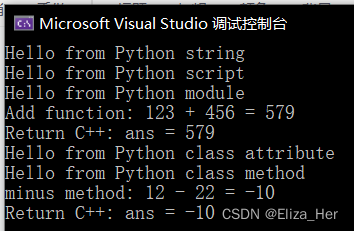
参考资料
文档:
- 官方API文档:The Very High Level Layer — Python 3.10.11 documentation
- API文档中文版本:C++调用Python浅析_pyeval_callobject_magictong的博客-CSDN博客
- 官方使用教程:1. 在其它应用程序嵌入 Python — Python 3.7.13 文档
- 官方API手册:Python 中文文档 - Python/C API 参考手册 | Docs4dev
博客:




















 122
122











 被折叠的 条评论
为什么被折叠?
被折叠的 条评论
为什么被折叠?








